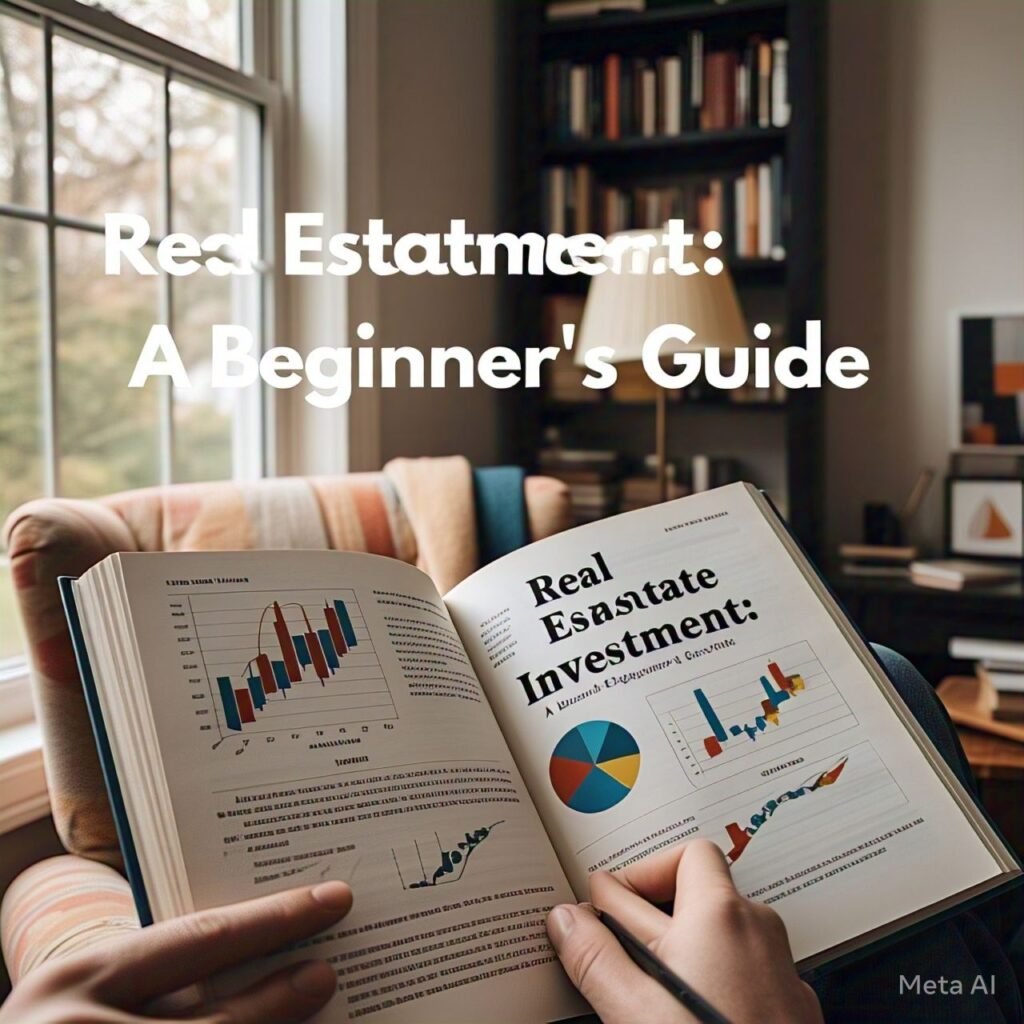Real Estate Investment: A Beginner’s Guide

📋 Outline
H1: Introduction
- Why real estate is a powerful investment tool
- Who should consider investing
H2: What is Real Estate Investing?
- Definition and core concept
- How it generates wealth
H2: Types of Real Estate Investments
- Residential properties
- Commercial properties
- Industrial real estate
- Land
- REITs (Real Estate Investment Trusts)
H2: Benefits of Real Estate Investing
- Cash flow
- Appreciation
- Tax advantages
- Leverage
H2: Risks of Real Estate Investing
- Market fluctuations
- Property maintenance
- Vacancies
- Liquidity issues
H2: Buy-and-Hold Strategy
- Long-term growth
- Passive income through rentals
H2: Fix-and-Flip Strategy
- Short-term profit potential
- Renovation risks
H2: Wholesaling in Real Estate
- Low-capital investment
- Finding and flipping contracts
H2: Real Estate Investment Trusts (REITs)
- Hands-off investment
- How to get started
H2: Crowdfunding Real Estate Platforms
- Lower barrier to entry
- Examples of platforms
H2: How to Finance Your First Investment Property
- Mortgage options
- Down payments
- Private lenders and partnerships
H2: How to Analyze a Property
- Location
- Rental potential
- Property condition
- ROI and cap rate
H2: Managing Your Investment Property
- Hiring property managers
- Dealing with tenants
- Maintenance and legal responsibilities
H2: Tax Implications and Benefits
- Depreciation
- Deductions
- 1031 exchange
H2: Tips for First-Time Real Estate Investors
- Start small
- Do your homework
- Build a real estate team
H1: Conclusion
H1: FAQs
💼 Real Estate Investment: A Beginner’s Guide
📍 Introduction
Thinking about investing in real estate but not sure where to start? You’re not alone. Real estate is one of the most popular paths to building long-term wealth, and for good reason—it offers passive income, capital growth, and even tax advantages.
This guide will walk you through the essentials so you can make informed decisions and begin your journey with confidence.
🏡 What is Real Estate Investing?
Real estate investing is the purchase, ownership, or sale of property to generate profit. It can come in many forms—from buying rental homes to investing in commercial buildings or even real estate stocks.
The two main ways to make money in real estate are:
- Appreciation (when property value increases)
- Rental income (steady cash flow)
🏢 Types of Real Estate Investments
1. Residential Properties
Think houses, apartments, and condos—these are the most common and beginner-friendly.
2. Commercial Properties
Office buildings, retail spaces, and restaurants fall here. These often have higher returns but require more capital and experience.
3. Industrial Real Estate
Warehouses, factories, and distribution centers—great for long-term leases and high returns.
4. Land
Raw land is a speculative investment. It could be developed or just held until its value increases.
5. REITs (Real Estate Investment Trusts)
REITs allow you to invest in real estate without owning physical property. You buy shares like stocks and earn dividends.

💰 Benefits of Real Estate Investing
- Steady Cash Flow: Monthly rental income can cover expenses and generate profit.
- Appreciation: Property values typically rise over time.
- Tax Benefits: Depreciation, deductions, and tax-deferred exchanges.
- Leverage: You can borrow money to control more valuable assets.
⚠️ Risks of Real Estate Investing
- Market Fluctuations: Property values can drop during economic downturns.
- Maintenance Costs: Repairs and upkeep can eat into profits.
- Vacancy Risk: Empty units mean no income.
- Low Liquidity: Real estate isn’t easy to sell quickly.
🧾 Buy-and-Hold Strategy
This is a long-term approach where you buy property and rent it out. You earn monthly income and your property appreciates over time.
Ideal for:
- Investors seeking passive income
- Those looking to build equity slowly
🔨 Fix-and-Flip Strategy
You buy underpriced or distressed property, renovate it, and sell for a profit. This requires knowledge, speed, and capital.
Risks include:
- Overestimating sale price
- Underestimating repair costs
💼 Wholesaling in Real Estate
Wholesaling means finding a property below market value, getting it under contract, and selling the contract to another investor for a fee.
Great for beginners with:
- Little upfront capital
- Strong negotiation skills
🏢 Real Estate Investment Trusts (REITs)
REITs are companies that own income-producing real estate. You can buy shares on the stock market and earn a portion of the profits.
Perfect if you want:
- Diversification
- Passive income
- Zero landlord responsibilities
💻 Crowdfunding Real Estate Platforms
Sites like Fundrise, RealtyMogul, and Roofstock let you invest in real estate for as little as $100.
Benefits include:
- Lower barrier to entry
- Hands-off investing
- Access to diverse projects
💳 How to Finance Your First Investment Property
Here are a few common funding options:
- Conventional mortgage loans
- FHA or VA loans (if eligible)
- Private lenders
- Hard money loans
- Partnering with investors
Pro tip: Save for a 20-25% down payment and maintain a good credit score.
🧠 How to Analyze a Property
Before you buy, do your homework:
- Location: Safe areas with strong rental demand
- Rental income potential: Compare similar rentals
- Expenses: Taxes, insurance, maintenance
- ROI: Return on Investment
- Cap rate: Net operating income ÷ property value
🔧 Managing Your Investment Property
You can either:
- Self-manage (save money but invest time)
- Hire a property manager (costs 8–12% of rent)
Duties include:
- Screening tenants
- Collecting rent
- Handling repairs
- Staying compliant with landlord laws
🧾 Tax Implications and Benefits
Real estate is full of tax perks:
- Depreciation: Deduct part of the property’s value every year.
- Expenses: Deduct repairs, management fees, travel.
- 1031 Exchange: Defer taxes when you sell one property and buy another.
Always consult a tax pro!
✅ Tips for First-Time Real Estate Investors
- Start small with a single-family home or duplex
- Learn the market and trends in your area
- Network with other investors, agents, and lenders
- Create a team: realtor, lender, contractor, attorney
- Have a backup plan for vacancies and repairs
🏁 Conclusion
Real estate investing isn’t just for the wealthy—it’s a smart, scalable way to build long-term wealth. With the right knowledge, strategy, and patience, you can start small and grow your portfolio over time.
Whether you’re looking for passive income or a way to diversify your investments, now is a great time to dip your toes into the world of real estate.
Start learning. Start planning. And most importantly—start investing.
🙋♀️ FAQs
Q1: How much money do I need to start investing in real estate?
A1: You can start with as little as $500 through REITs or crowdfunding, or $20K–$50K for traditional properties.
Q2: Is real estate better than stocks?
A2: It depends. Real estate is tangible and offers passive income, while stocks are more liquid and easier to diversify.
Q3: What’s the best type of property for beginners?
A3: Single-family homes or small multifamily units (like duplexes) are a great starting point.
Q4: Do I need a license to invest in real estate?
A4: No license needed unless you’re becoming a real estate agent. You can invest as an individual.
Q5: How do I know if a property is a good deal?
A5: Analyze its ROI, location, condition, rental demand, and cash flow potential before buying.




